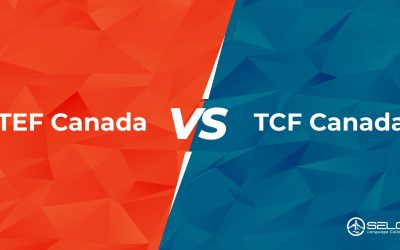Think of it as your ultimate preparation companion, offering you the sort of advice you’d get from someone who’s been through it!
From developing a solid study plan to finding the right practice resources, we’ll go over everything so you can feel confident and ready on test day.
Are you set to begin? Let’s get it done — à la réussite!
Key Takeaways:
- Learn the TEF exam structure and scoring.
- Develop an efficient study plan for success.
- Enhance listening, speaking, reading, and writing skills.
Exam Format is One of the First TEF Canada Tips
TEF Canada exam format should be your first target to
This test measures your French language skills in various sections.
Let’s dive into the essential components you need to know.
How is the TEF Exam Structured?
The TEF exam has three main sections.
First, there is Listening (Compréhension orale), where you will listen to audio clips and answer questions.
Next, the Reading (Compréhension écrite) section tests your ability to understand written French texts.
Finally, the Speaking (Expression orale) part assesses your ability to communicate verbally in French.
What are the Additional Components of the TEF?
In addition to the main sections, the TEF exam includes Writing (Expression écrite).
Here, you will write essays or letters.
There is also the Vocabulary and Structure (Lexique et structure) component, which tests your knowledge of French vocabulary and grammar.
How Can You Familiarize Yourself with the Exam?
To succeed, you need to understand the scoring method used in the TEF exam.
At SELC Language, we help you grasp these expectations.
We provide a detailed orientation on what to expect, ensuring you’re well-prepared for each section.
By familiarizing yourself with the exam format and scoring, you can approach the TEF with confidence and clarity.
How Do You Develop an Effective Study Plan for TEF Canada?
Creating a structured study plan is key to conquering the TEF exam.
This plan should be efficient and focused, guiding you through each section of the exam.
Let’s dive into how to set up a study plan that will set you on the path to success.
Why is Structured Preparation Important?
Structured preparation is vital because it keeps you on track.
By setting weekly goals for each exam section, you can manage your time effectively.
Guidance from certified instructors ensures you focus on what matters most.
What Resources are Available for Structured Learning?
At SELC, we offer courses from levels A1 to C1.
These courses include vocabulary building and grammar refinement.
This structured approach helps you master the language step by step.
How Can You Simulate Exam Conditions?
Simulating exam conditions is crucial for building confidence.
We provide exam simulations that mimic the real test environment.
Performance tracking helps you identify areas for improvement, allowing you to adjust your study plan accordingly.
How Can You Enhance Your Listening Comprehension in the TEF Exam?
Improving your listening skills is key to acing the TEF exam.
Listening comprehension tests your ability to understand spoken French in various contexts.
Let’s explore how you can enhance your skills and what resources are available.
What Should You Listen to Regularly?
To improve your French listening skills, tune into French radio and podcasts.
Stations like RFI and TV5Monde are excellent choices.
They offer a range of content that helps you get used to different accents.
Understanding both Quebecois and European French accents is crucial.
This diversity in listening material will prepare you for the varied accents you might encounter in the TEF exam.
Regular listening will also boost your vocabulary and contextual understanding.
How Does SELC Facilitate Listening Practice?
SELC Language offers in-class audio analysis workshops.
These workshops simulate real TEF listening tasks.
You receive feedback from native-speaking instructors, which is invaluable.
This feedback helps you identify areas for improvement and refine your listening skills.
The workshops are designed to mirror the exam format, making you more comfortable with the test structure.
By engaging in these activities, you build confidence and improve your listening comprehension.
How Can You Practice Speaking Under Exam Conditions?
Mastering the TEF exam requires a strong focus on speaking skills.
Enhancing your French speaking abilities can set you apart.
Let’s explore effective strategies and how SELC Language supports you on this journey.
What are Effective Speaking Strategies?
When preparing for the TEF, clarity and coherence are the core of your preparation.
If you plan to get the score you need to get on the TEF Canada exam, you should avoid the trap of aiming for perfection.
Instead, focus on expressing your thoughts clearly.
Practice spontaneous responses as well.
This will help you handle unexpected questions with ease.
Engaging in real-life scenarios, like role-playing phone calls, can boost your confidence.
These strategies ensure you are ready for the Expression Orale section.
How Does SELC Prepare You for Speaking?
At SELC, we believe in personalized learning. Our approach includes 1:1 speaking practice.
This allows you to receive tailored feedback from experienced instructors.
Mock oral interviews simulate real exam conditions.
These sessions help you practice under pressure.
With our support, you will learn to speak confidently and naturally.
This preparation is crucial for excelling in the TEF exam.
How Do You Sharpen Your Reading and Grammar Skills?
To excel in the TEF exam, honing your reading and grammar skills is crucial.
These skills are the backbone of understanding French texts and using the language correctly.
To start, focus on reading a variety of texts to build your French vocabulary for exams.
What Types of Texts Should You Read?
Diverse reading materials can significantly improve comprehension.
Aim to read emails, newspaper articles, and blogs.
These sources expose you to different writing styles and contexts.
Pay attention to context clues and grammar patterns within these texts.
They help you infer meanings and understand sentence structures.
This practice is invaluable for mastering French language study guides and other educational materials for French.
How Does SELC Enhance Reading Skills?
At SELC Language, we offer targeted resources to boost your reading proficiency.
Our TEF Reading Comprehension modules are designed to mimic real exam scenarios.
These modules are paired with grammar workshops to refine your understanding of syntax and connectors.
Our approach ensures that students can tackle exam preparation tips with confidence.
By focusing on these areas, you will be well-equipped to navigate the challenges of French vocabulary for exams.
This comprehensive strategy will set you on the path to success in the TEF exam.
How Can You Improve Your Writing with Real Prompts?
Writing in French can be daunting, but mastering it is crucial for the TEF exam.
Understanding how to craft structured responses and maintain the right tone is key.
Let’s explore effective writing practices and how SELC Language supports your journey.
What Writing Practices are Effective?
Effective writing for the TEF exam involves creating structured responses.
This means organizing your thoughts clearly in emails, opinion pieces, or arguments.
Always keep an eye on tone and word limits to ensure your writing is concise and relevant.
Staying within these boundaries helps convey your message effectively and meets exam criteria.
Practice regularly with different prompts to build confidence and proficiency.
How Does SELC Assist with Writing Skills?
At SELC Language, we offer writing correction services to refine your skills.
Our instructors provide detailed feedback on grammar, coherence, and structure.
This feedback is tailored to help you understand common mistakes and improve your writing style.
With our support, you’ll learn to express your ideas clearly and effectively.
Our goal is to guide you toward achieving success in the TEF exam through personalized attention.
Why are Mock Exams and Feedback Crucial?
Mock exams are a vital part of preparing for the TEF exam.
They help you understand the exam format and manage time effectively.
Let’s explore how mock exams simulate real conditions and the feedback mechanisms SELC offers to enhance your preparation.
How Do Mock Exams Simulate Real Conditions?
Mock exams provide a realistic test environment by replicating the full TEF Canada exam format.
They include all sections, such as Listening, Reading, and Speaking.
These simulations are timed to reflect actual exam conditions, helping you practice time management and reduce anxiety.
By experiencing the exam setting, you become familiar with the pace and pressure, which boosts confidence and performance.
What Feedback Mechanisms Does SELC Offer?
We at SELC Language provide robust feedback mechanisms to track your progress.
After mock exams, you receive detailed performance tracking to identify strengths and weaknesses.
One-on-one review sessions with instructors offer personalized guidance.
These sessions focus on specific areas for improvement, ensuring you refine your skills and strategies for the actual exam.
This targeted feedback helps you adjust your study plan and achieve better results.
What is the Structure of the TEF Exam?
The TEF exam format is key to your success. Before we briefly explain the structure of TEF Canada, we highly recommend you to check all the information about TEF Canada that was published before.
This French language proficiency test assesses various skills.
Let’s break down the main sections and additional components of the TEF exam.
How is the TEF Exam Structured?
The TEF exam consists of three main sections:
- Listening (Compréhension orale): This section tests your ability to understand spoken French. You’ll listen to various audio clips and answer questions based on them.
- Reading (Compréhension écrite): Here, you’ll read different texts and respond to questions to demonstrate your comprehension skills.
- Speaking (Expression orale): This part evaluates your spoken French through tasks like describing situations or expressing opinions.
What are the Additional Components of the TEF?
Besides the main sections, the TEF includes:
- Writing (Expression écrite): You’ll write essays or structured responses to given prompts.
- Vocabulary and Structure (Lexique et structure): This part tests your knowledge of French vocabulary and grammar.
How Can You Familiarize Yourself with the Exam?
To excel, you need to understand the scoring method and what to expect on the test day.
At SELC Language, we provide a comprehensive orientation on exam expectations.
We ensure you’re well-prepared for each section.
Familiarizing yourself with these elements will boost your confidence and performance.
Mastering the TEF exam requires understanding its structure and developing a solid study plan.
You need to focus on listening, reading, speaking, and writing skills.
Use resources like SELC French courses and practice with mock exams to track progress.
Regularly listening to French media and practicing speaking under exam conditions will boost your confidence.
Reading varied texts sharpens comprehension and grammar skills.
Writing with real prompts helps refine your expression. Mock exams and feedback are vital for real-world readiness.
Embrace these strategies to excel in your TEF exam journey.






0 Comments